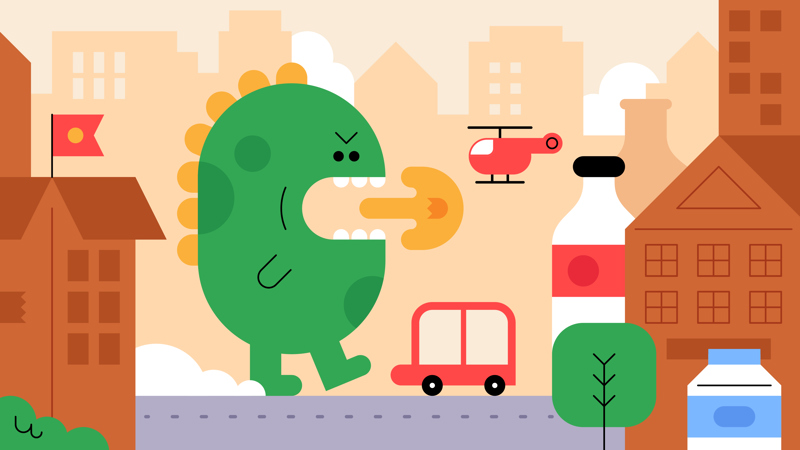
We built this shoebox city
You’ll need
- Paint
- Paint brushes
- A4 paper
- PVA glue
- Clean items of recycling
- A selection of boxes
Before you begin
- You could ask parents and carers to help you collect boxes (and other recycling). Boxes such as shoeboxes and delivery boxes from online orders are perfect.
We built this city
- Everyone should decide together whether their city will be imaginary or based on their local area.
- Everyone should split into groups, and decide together which group will focus on different buildings or areas.
- Everyone should start to choose the boxes (and other materials) their building may need. People could do this in their groups, depending on the amount of materials available.
- Everyone should use their boxes and other materials to make their building or area.
- Everyone should use black paint (or thick pens) to draw doors and windows on their building. They could also add other detail, for example, making trees out of cardboard tubes and scrunched up tissue paper or roads from black and white paper.
- Everyone should work together to place the finished buildings, trees, and roads onto the floor or a table. It should map out just like a real city – think about where the roads need to go. If people chose to recreate their local area, they may want to look at a photograph or map to help them decide where to put the buildings.
- Everyone should add toys, such as cars and people, and enjoy playing with their model city.
Reflection
This activity was a chance to develop everyone’s constructions skills. How did everyone decide which bit of the city they’d like to make? Did some buildings work better than others? People may have found that some of the boxes were stronger than others, or that buildings fell over if they got too tall. Well done to everyone for working together to build a city and for learning more about the good and bad ways to build things.
Safety
All activities must be safely managed. You must complete a thorough risk assessment and take appropriate steps to reduce risk. Use the safety checklist to help you plan and risk assess your activity. Always get approval for the activity, and have suitable supervision and an InTouch process.
- Scissors
Supervise young people appropriately when they’re using scissors. Store all sharp objects securely, out of the reach of young people.
- Glue and solvents
Always supervise young people appropriately when they’re using glue and solvent products. Make sure there’s plenty of ventilation. Be aware of any medical conditions that could be affected by glue or solvent use and make adjustments as needed.
- Rubbish and recycling
All items should be clean and suitable for this activity.
If you have longer than one session (and somewhere to store the city), or if you’re doing this activity during a sleepover, you could use paint to colour the buildings. You may need to mix some PVA glue into the paint if the boxes are shiny. You could also add more details such as flags, road signs, place names, parks, ponds, and other features.
People could work in different size groups, depending on what’s best for them.
All Scout activities should be inclusive and accessible.
You could scale it up or down, or make more than one city. Packing boxes or supermarket boxes could become buildings big enough for people to climb into, or smaller boxes such as toothpaste, match, or fun-size sweet boxes would make a mini city. Working in teams for this activity could be a chance to work towards the Beavers Teamwork Challenge Award, or you could adapt this activity (for example, including time to plan what to build) so it counts towards the Builder Activity Badge. Could you even organise a (safe!) visit to meet some real construction workers?
Everyone can choose the building they’d like to make.

